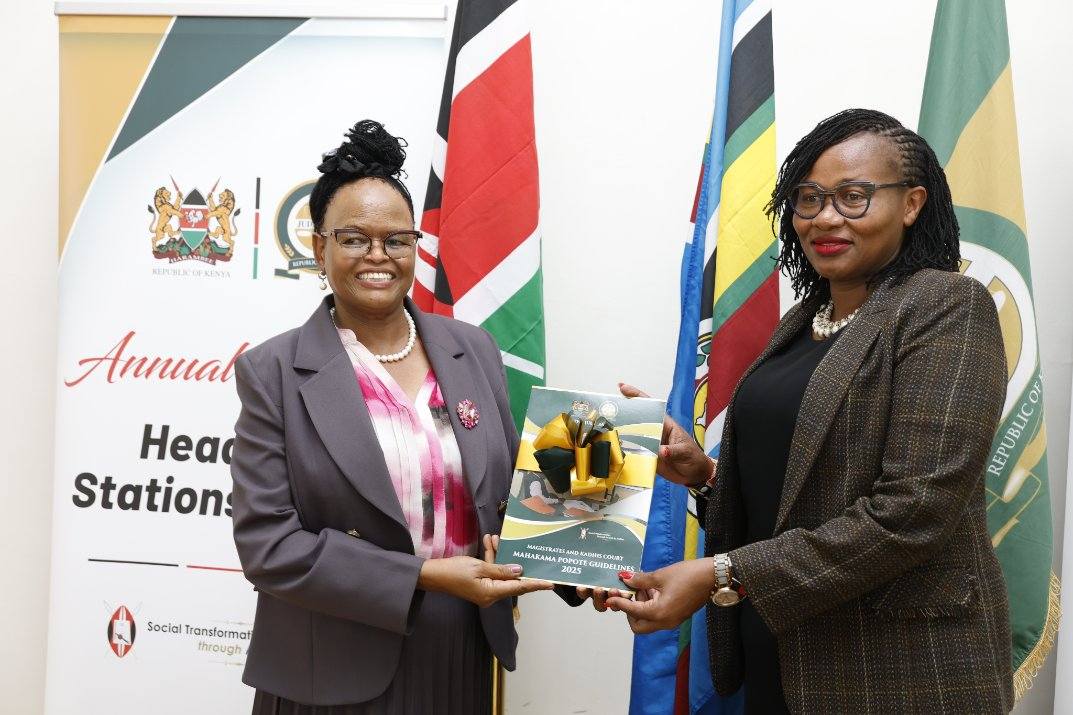 Chief Justice Martha Koome during the Launch of Mahakama Popote Guidelines in Makueni. Photo by Andrew Mbuva
Chief Justice Martha Koome during the Launch of Mahakama Popote Guidelines in Makueni. Photo by Andrew Mbuva
By Andrew Mbuva
Chief Justice Martha Koome has officially launched the Mahakama Popote Guidelines, a transformative set of protocols that govern the Judiciary’s virtual case management system—designed to allow judicial officers to handle cases from any location across the country using technology.
The Mahakama Popote program, already implemented in Magistrates’ Courts, is a bold step toward modernizing judicial processes and optimizing the deployment of judicial officers. It eliminates geographical restrictions by enabling cases to be handled remotely, regardless of the court station in which they were filed. Since its rollout in October 2022, the platform has facilitated 17,389 cases, with 12,940 concluded by March 2025.
Speaking during the opening of the 12th Annual Heads of Station Forum in Makueni County, CJ Koome said the innovation promotes flexibility, efficiency, and timely access to justice for all Kenyans.
She praised judicial officers for their resilience during recent political and democratic challenges, citing instances where bail applications and habeas corpus petitions were heard beyond regular court hours. She emphasized that even in challenging times, the Judiciary remains committed to upholding the rule of law.
The Chief Justice urged court leaders to remain deeply committed to ethical, efficient, and citizen-centered service delivery. She told the gathering of Heads of Station—drawn from 143 Magistrates’ Courts and 14 stand-alone Kadhis’ Courts—that their leadership is vital, as they supervise the majority of Judiciary staff and are the primary point of contact for many court users.
She stressed that how court leaders manage operations, from timely judgments to effective registry supervision, directly influences public trust in the institution. Koome also issued a stern warning against corruption, particularly the practice of soliciting unofficial payments in court registries. She called for zero tolerance to such unethical behavior, reaffirming that judicial officers are salaried to serve and should never demand extra money from the public.
To address unethical conduct, Koome called on Court Integrity Committees to become active and responsive, encouraging them to escalate serious concerns to the Judiciary Ombudsman, her office, or the Ethics and Anti-Corruption Commission.
Presenting performance data for the period between July 2024 and March 2025, the Chief Justice commended the Magistrates’ and Kadhis’ Courts for maintaining high Case Clearance Rates (CCR).
Magistrates’ Courts recorded a CCR of 97.3%, with 62 courts exceeding 100%. Kigumo Law Court posted the highest clearance rates—156% in criminal and 236% in civil cases. The Kadhis’ Courts posted an overall CCR of 97%, with Kwale Court leading at 144%.
Heads of Station were directed to clear all cases that have been pending for over three years and to implement Rapid Results Initiatives (RRIs) to resolve uncontested succession cases by December 20, 2025.
Makueni County Deputy Governor Lucy Mulili, who also addressed the forum, raised concern over rising Gender-Based Violence (GBV) cases. She commended the Judiciary for prioritizing their resolution and said Makueni County is now allocating resources for succession matters at the ward level. She noted that public legal awareness remains low, even among the educated, and that community legal clinics had revealed major knowledge gaps in succession issues.
Chief Registrar of the Judiciary Winfridah Mokaya said the forum is a key platform for engaging Heads of Stations on critical themes like discipline, supervision, staff welfare, infrastructure, and performance. She said the Judiciary is committed to fostering a unified culture of excellence and ethical conduct across all courts.
The CRJ reassured judicial officers that no station will experience further budget cuts under current ceilings and emphasized that efforts will continue to ensure courts are well-resourced, even under constrained budgets.